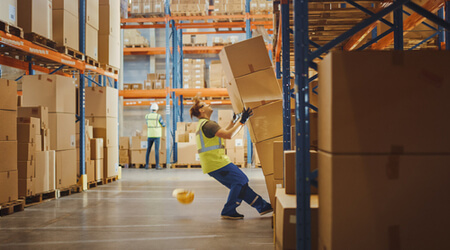
Warehouse workers in South Carolina face numerous hazards, and, unfortunately, many workers sustain injuries on the job. When workplace accidents occur, the South Carolina workers’ compensation lawyers at Joye Law Firm are here to help. Our practice is focused in part on helping injured and disabled workers in Charleston, Columbia, Myrtle Beach, and Clinton receive the full workers’ compensation benefits available by law. Our experienced S.C. workers’ compensation attorneys have helped injured workers appeal denied claims after the workers sustained injuries in warehouse accidents.
If you have been injured while working in a warehouse in South Carolina, you may be entitled to workers’ compensation benefits. South Carolina workers’ compensation laws are designed to protect employees who suffer certain workplace injuries. Workers’ compensation provides an injured warehouse worker with coverage for medical care and rehabilitation, partial replacement of your wages while you cannot work and disability payments.
If you were injured in a work-related accident at a warehouse, call Joye Law Firm today at (888) 324-3100 or contact us online to schedule a free, no-obligation consultation.
Common Causes of Warehouse Injuries in South Carolina
Warehouse workers in South Carolina can be injured in a variety of ways, including:
Slip and fall injuries – Slip and fall injuries can occur when warehouse workers slip on floor surfaces or fall off loading docks, walkways, or elevated platforms. Various hazards can cause slip and fall accidents, including:
- Liquid spills
- Electrical cords and hoses lying across walkways
- Cluttered aisles
Slips, trips, and falls result in accidental deaths and thousands of injuries every year.
Forklift accidents – Forklifts are commonly used in warehouses to move, raise, and lower objects. Unfortunately, accidents involving forklifts are a leading cause of injuries in warehouses. One of the most prevalent causes of forklift-related fatalities and serious injuries is when the forklift overturns and crushes the worker. Forklifts also can cause severe injury to warehouse workers who are working in the vicinity of a forklift.
Forklift accidents often occur due to poor training and unsafe operational use. It’s very important that workers who operate a forklift have the necessary certification and proper training. According to the Occupational Safety and Health Administration (OSHA), forklift accidents are responsible for about 100 deaths and nearly 100,000 injuries each year nationwide.
Loading dock injuries – Loading docks are one of the most dangerous places in a warehouse. Accidents that occur at the loading bays are often serious or even fatal due to the weight and size of the cargo involved. Many loading dock injury victims suffer from broken bones, torn ligaments and head injuries, which can keep them from ever returning to work at a warehouse again.
Accident scenarios common to loading docks include:
- A pallet tipping over because it is improperly loaded and falls onto a worker
- Falls from the dock platform
- A forklift dropping heavy objects or falling off a loading dock
- Being struck by a falling load
- A large load blocking a forklift operator’s view
- Being struck by a truck that is backing up
- Getting pinned between a truck or forklift and a wall
- A malfunctioning overhead gate or door that crushes a worker
- Fingers being crushed by a loading dock leveler
Overexertion injuries – Too much stress on the body is a common cause of warehouse injuries. Overexertion often happens when a worker tries to lift too much weight. The shoulders and back are most likely to be injured when a worker overexerts himself or herself. Along with lifting, pushing, pulling, and carrying are common causes of overexertion injuries.
Repetitive stress injuries – These injuries stem from the repetitive nature of the work that many warehouse workers perform. Repetitive motion and stress injuries can cause agonizing pain. Many warehouse workers experience pain, tingling, numbness, and weakness in the back, neck, shoulders, arms, and wrists. These symptoms may begin gradually and be ignored initially. But, if they are not given the necessary attention, the symptoms can get worse worsen and become debilitating. Common repetitive stress conditions include carpal tunnel syndrome, cubital tunnel syndrome, and De Quervain’s syndrome (wrist).
Fires and explosions – Depending on the type of warehouse, there may be flammable materials or fluids present that could start a fire. It’s critical that employers regularly check for potential fire hazards. Warehouse fires are particularly dangerous because they often lead to explosions.
Falling from heights and falling objects – To maximize space, warehouses will stack products so high that it requires forklifts and ladders to remove the products from the shelves. Workers can fall from ladders and forklifts while trying to reach products. This can cause broken bones, sprains, and/or head injuries. Objects falling from high shelves are also are a major hazard.










